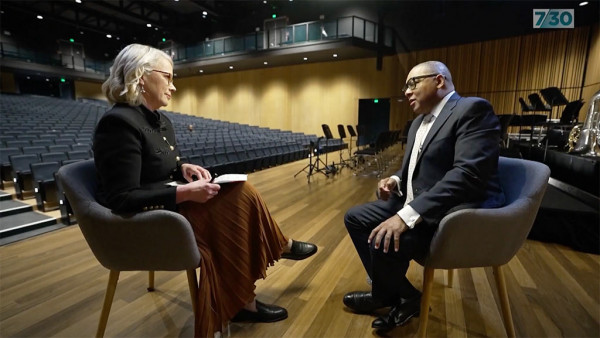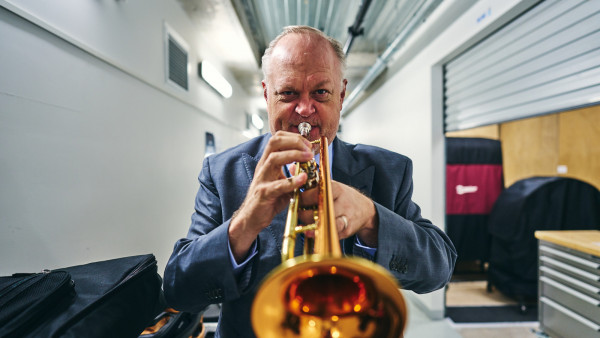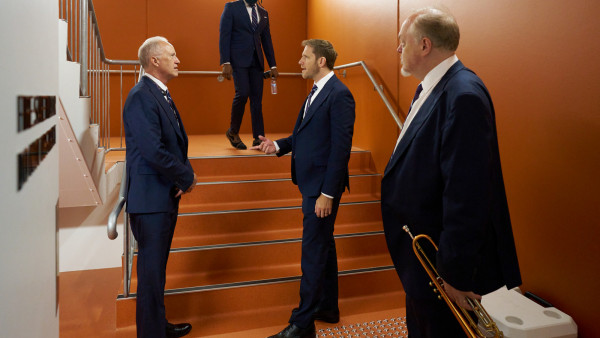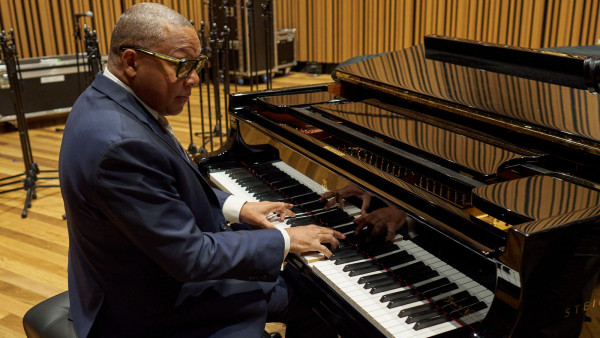An evening (and morning) with one of jazz’s all time greats
Can a trumpet actually sing? Can a jazz orchestra really speak to you?
If the trumpet is played by and the orchestra is led by Wynton Marsalis, then the answers to both questions are a profound yes.
The house of swing came to Canberra this week and moved everyone who had the privilege of experiencing the world’s best jazz right here in the capital.
In what was an impressive coup for the Snow Concert Hall located in Canberra Grammar School (and for the artistic director of its International Series concerts, flautist Ana de la Vega) the legendary Jazz at Lincoln Center Orchestra played two sellout nights there to kickstart a national tour.
Marsalis is the managing and artistic director of the orchestra and the ‘house of swing’ is what he affectionately calls its New York City headquarters.
The visit to Canberra included a six-day residency where Marsalis and his team of exceptionally talented musicians held educational workshops for students, who could hardly disguise the awe they were feeling.
Wynton Marsalis has an incredible presence, and not just when he’s on stage.
I was to find that out the day before opening night – which, by the way, was an astounding concert in all its big band improvisational wonder.
He oozes intelligence, speaks in respectful tones and is a very funny, likeable guy.
What is most striking is that while his brilliance shines through every word he says and every note he plays, he is a disarmingly humble man who appears genuinely interested in people.
When he talks to you he gives you all the time in the world, making you feel like you’re the only person in the room.
And for about half an hour I was the only person in the room with him.
What was meant to be a five-minute one-on-one interview at the side of the stage (just after an all-in media conference and just before a band rehearsal) turned into a long walk through the backstage corridors and upstairs into a cosy green room.
Along the way, while introducing me to some band members, he kept telling me to forget about everyone else who was saying we didn’t have much time.
“I feel like you and I can have a good chat about music,” he said as he ushered me in.
While walking to the green room I mentioned how I enjoyed Laura Tingle’s interview with him the night before on the ABC’s 7.30 program.
“I really liked her,” he said. “Good questions.”
They were good questions, but what was I going to ask him?
Wynton made that very easy.
He has lived a big life, mingling with the jazz greats to become possibly the greatest of them all.
He was the first ever jazz player to be awarded the Pulitzer Prize for Music – oh yeah, and he’s also got nine Grammy Awards.
So he has a lot of stories to share and he invited me to allow him to do just that.
He paid reverence to Dizzy Gillespie, Duke Ellington and Thelonious Monk and talked mischievously of Chick Corea and Charlie Mingus.
Tell me about Dave Brubeck, I asked.
Wynton’s face lit up at the mention of the late jazz pianist best known for the groundbreakingly cool Take Five.
“Dave had rainbows in his pockets,” Wynton smiled.
“You always felt better after any time you met him. You felt better than you did before seeing him.
“I was once in Claremont Hotel in Oakland and had come from playing basketball. I came into the lobby and there were a lot of older, really well-dressed people there.
“I was trying to sneak past them because I was all sweaty, and then someone put their hand on me. It was Dave Brubeck.
“He said ‘Hey man’ and I said ‘What’s going on?’ and he just looked at me and said ‘It’s Ellis’s son’ [Ellis is Wynton’s late piano-playing father, who was still alive at the time of this encounter]. He always called me Ellis’s son.
“Then he took me around and introduced me to everyone in the lobby as Ellis’s son.
“Dave was a good man. He was very soulful.”
And what of fellow (but long gone) jazz trumpeter Miles Davis?
“Miles and I, we didn’t get along. I felt he had sold out and he knew that and that’s ok. That actually became the American way,” he said.
The ‘straight-ahead jazz’ proponent Marsalis hated Davis’s embrace of pop styles and thought the seminal Bitches Brew album was a betrayal of jazz music.
“But he still was a genius and he still was brilliant and he still was owed the respect for his genius and his greatness – and I always gave it to him when I saw him in person,” Wynton added.
“There was never a time when I addressed him disrespectfully or did not try to learn something when I was in his presence. He always told me something that would help me learn how to play.
“He was funny too. Miles was also very intelligent. So when you talked with him, he was extremely acute in his understanding of things.”
Had there been a lasting connection with pioneering filmmaker Ken Burns, who introduced Marsalis to a whole new worldwide audience with his 2001 Jazz documentary series?
“I love Ken Burns,” he said.
“He’s one of my best friends. I depend on him. If I have any kind of problem I’ll call him.
“He’s such a genius and so dedicated. I feel so fortunate to be alive at a time with him. He’s for real, man.”
And what about jazz itself? Can it be easily defined as a musical genre?
“It’s not difficult to define it in the broader sense. The difficulty is when you want the definition to be little,” he said.
“It’s almost like biblical stories and things that are allegorical. They’re allegorical because they’re not little.
“If you want it to be little, then no it’s not possible to define it. If you want it to be allegorical and you touch on the fundamentals of it, then yeah it’s easy to do.
“Blues is one element of jazz. Improvisation is another element. Swing is another, and the attitude of swing. Then there’s the Afro-Latin attitude.
“Most of jazz you can find in those things, but that doesn’t mean that literally nothing else can fit in there. It’s not little.”
He talked in terms of jazz being a metaphor for democracy because it celebrates personal freedom and encourages individual expression. And, because it is rooted in the blues, it inspires people to face adversity with optimism.
But does he chill out listening to Bob Dylan or the like?
Shakes his head.
“I love jazz man. I mean, I listen to other music… but I love jazz. I don’t find the need to not love it and l also don’t find the need to not express the love for it.”
by Chris Johnson
Source: Riotact




